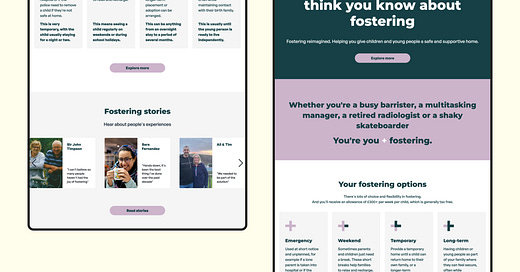How we helped Now Foster re-imagine fostering
We provided the tech expertise to kick-start a new approach to fostering recruitment in East London.
The fostering system isn’t working.
London alone needs 1100 new foster carers over the next year, not to mention the next ten.
The reasons for this are systemic.
There is a split between councils, who care for most of the children in need, especially those with the most complex needs, but are systematically underfunded, and expensive private fostering agencies.
Now Foster is a social enterprise formed by a group of former social workers dissatisfied with the current state of fostering services.
With support from Impossible Ideas, Inc, a venture studio active in transforming local government services, Now Foster providing a new option that’s both more child-centred and community-centred.
If we want to fix fostering, we have to appeal to a drastically broader profile of people.
People think they need to be saints or angels to foster, and their ideas about what fostering actually involves are unrepresentative.
So, we can help by:
addressing myths and falsehoods about fostering
clarifying the practical requirements and benefits
We helped them make a digital experience that can go toe-to-toe with established private fostering agencies, as well as being the tip of spear for this appeal-broadening work.
What we made
The digital experience has three parts:
a landing page
a “readiness checker” tool
a way to book a chat with a fostering coach
The landing page makes the point that fostering isn’t just one thing. There’s actually at least four different kinds of fostering.
Most of us picture long-term fostering, but there’s also emergency, weekend and temporary options.

We also added a “readiness checker”. It’s basically an open-ended quiz that users can explore in their own time, asking practical questions and presenting clear guidance, as well as encouraging users to interrogate their own preconceptions about fostering.
The readiness checker design pattern is one we’ve used before, but it’s a particularly good fit here. An earlier experiment with Buckinghamshire Council used a similar pattern.
Once you’ve explored the different topics, you’ll be offered a chance to book a half-hour chat with one of Now Foster’s coaches, which smoothly leads into their onboarding and learning process for prospective carers.
Answers to the quiz can be shared or kept private (the default).
How we made it
We kept custom software development to a minimum, and we didn’t want Now Foster to have to learn any new tools they didn’t already use. We used:
plain old Google Calendar to handle appointment bookings, via a simple API that looks for events in a particular calendar, and adds the user as an attendee when they book a chat. This way, we don’t need to handle inputting or storing appointment slots.
Contentful for managing content, including for the readiness checker. Contentful lets us define custom, nested content types that are a great fit for a quiz. Plus, at our level of usage it’s completely free.
FaunaDB to record the contact details of anyone who books a chat. We’re considering how we might use this database to power a proper case management tool in future phases of work.
What happens next
Now Foster are running a pilot in partnership with Newham Council, in London.
They’re taking a “continuous evaluation” approach. We’ve been using analytics tools to see how people move through the readiness checker, how long it takes them and where they get stuck.
We can use these insights to make changes as we learn what works, rather than waiting for a firmly defined checkpoint.
Colophon
Product design by Elle Tweedy.
Web and software development by Jaye Hackett and Amy Rogers. The codebase is open source.
Now Foster is working in partnership with Impossible Ideas, Inc and Newham Council.
The main design patterns of this work originated in an earlier adoption project we did for Buckinghamshire Council.
If you want to talk to Interrobang about this work, email hello@interrobang.coop.





